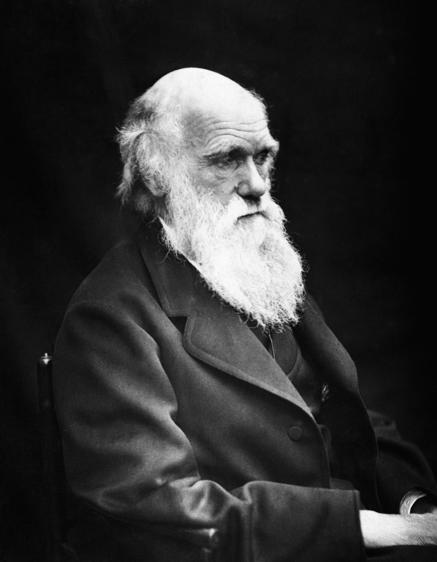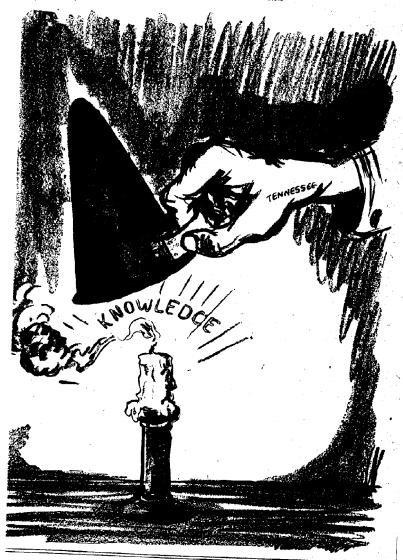Summary
Failing in the academic arena, schools and theme parks have become the new battleground for religious conservatives' fight against evolutionary theory
In 1925, the American state of Tennessee passed the Butler Law to explicitly ban evolution from all university and public school curricula, prohibiting teachers “to teach any theory that denies the story of the Divine Creation of man as taught in the Bible, and to teach instead that man has descended from a lower order of animals.” Faced with many Southern states with similar laws, the American Civil Liberties Union (ACLU) initiated a court case in the summer of that same year, to test the constitutionality of the law. In a Tennessee courtroom, a jury was to decide the fate of John T. Scopes, a young high-school biology teacher charged with illegally teaching that man originates from monkeys. This trial, later known as the Scopes Monkey Trial and the first ever US trial to be broadcast live on national radio, ended with a guilty verdict for Scopes, although this was reversed in 1927 by the Supreme Court of Tennessee, albeit on technical grounds.
John Thomas Scopes as he stood before the judges' stand and was sentenced in July 1925 in Dayton, Tennessee, USA © Bettmann/CORBIS
Almost an entire century later, there are still storms over the teaching of the theory of evolution. Ever since the publication of The Origin of Species, Darwin's thoughts have been criticized and attacked by creationists who defend their religious beliefs. And their attitude has been contagious, spreading in different local and national environments. However, it seems that, as in the Scopes trial, what is most crucial in current disputes is not just the legitimacy of teaching evolution or the resistance to it on the basis of scientific arguments. Also at stake are underlying social, intellectual and political values.
Last April, the Italian Minister for Education and Research, Letizia Moratti, caused a general outcry among scientists, educators and school administrators when she announced the abolishment of Darwinian theories from standard secondary school curricula. Established by legislative decree in February, the new teaching programmes for secondary schools made no mention of the history of human evolution, nor of the relationship between mankind and other species. A huge uproar was the result. The ministry was inundated by protest e-mails and faxes. And a petition was signed by more than 50,000 individuals, including Italy's top scientists such as Nobel Laureate Rita Levi-Montalcini, in La Repubblica, one of the country's most widely read newspapers. Together, these pressurized Ms Moratti to reconsider her position and ensure that the theory of evolution will be taught from the primary school level.
Notwithstanding Italy's strong Catholic tradition, there seems to have been no pressure from the Church to cause this ministerial manoeuvre. The influential Roman Catholic Church has no radical objections to Darwinism. The Pope himself has issued statements about evolution being compatible with the Catholic doctrine. Pressure might instead have come from far-right political groups, which are part of the ruling coalition government. Startled by the ministry's action, Ernesto Capanna, Professor of Comparative Anatomy in the Faculty of Natural Sciences at the University of Rome, La Sapienza, and member of the Accademia Nazionale dei Lincei, Italy's national academy of science, said “there is no rational answer to what happened....One reason could be some political circles' desire for self-lesion, another could be their complete ignorance. They talk about the Darwinian theory like they would talk of the Copernican theory, regretting the good old days of Linnaeus or Ptolemy. All this is pure folly.”
The Pope himself has issued statements about evolution being compatible with the Catholic doctrine
While this case seems to be settled in Italy, creationism and the battle over the teaching of evolution have been a perennial irritation in the USA and the debate is ongoing and still very heated. Despite their failures since the beginning of the twentieth century, creationists' attempts to introduce religion in public science education are unceasing. Back in 1987, the US Supreme Court issued a decree affirming that creationism is a religion and that it therefore cannot be taught in science classes. This was supposed to be a stall for fervent religious preachers of creationism, but the decree also affirmed the right of teachers to teach all scientific theories. As a result, since then creationism has become a theory, too, and a new generation of creationists have apparently abandoned their scriptural inspiration and pointed instead to a whole new advocacy of creationism by means of a movement called 'the Wedge', supported by those associated with the Discovery Institute and the Center for Science and Culture based in Seattle, WA, USA.
Charles Darwin (1809–1882) photographed in 1869 by Julia Margaret Cameron © Bettmann/CORBIS
The Wedge has the explicit plan to undermine public support for the teaching of evolution, while bringing forward what they consider a sound alternative theory: 'intelligent design' (ID). This theory simply considers living organisms, their cells and their structural and biochemical properties too complex and sophisticated to have been a result of natural selection alone. Consequently, they must have been designed by a super-intellect. At the theoretical level, ID thinkers claim that evolutionary biology has been hugely unsuccessful as a scientific theory in accounting for the origin of life and the emergence of biological complexity and they attribute this to its lack of teleology.
ID supporters define themselves as 'theistic realists' as opposed to 'methodological naturalists'. “They reject methodological naturalism, according to which science must explain using only natural causes, because they believe that it leads to philosophical naturalism, i.e. the belief that there is nothing but matter and energy in the universe,” explained Eugenie Scott, Executive Director of the National Center for Science Education in Oakland, CA, USA. A theistic realist, conversely, assumes that the universe and all its creatures were brought into existence for a purpose by God. Methodological naturalists would never leave anything to be explained by a supernatural cause and would attribute all events in evolution to unintelligent causes, which they are searching to identify. It is this lack of teleology that ID theory sees as the pitfall of evolutionary biology.
However, “intelligent design seems to be just as scripturally based as earlier forms of creationism,” commented Barbara Forrest, Professor of Philosophy at Southeastern Louisiana University (Hammond, LA, USA). “Even though ID proponents claim to have sound scientific arguments to back up their claims, they have not so far produced any original science in favour of ID,” she continued. “At least, if they have any science, they have not published it anywhere, especially in mainstream, peer-reviewed, scientific journals. Their arguments have been extensively critiqued by qualified scientists who have showed these arguments to be fatally flawed.”
Even William Dembski, Professor at Baylor University's Institute for Faith and Learning (Waco, TX, USA) and ID's main intellectual and apologist, has admitted that the Wedge movement has not met its scientific goals. “We have done amazingly well in creating a cultural movement, but we must not exaggerate ID's successes on the scientific front...the scientific research part of ID is lagging behind,” he said in his keynote address at a RAPID (Research and Progress in Intelligent Design) conference in 2002 in La Mirada, CA, USA.
Let There Be Darkness by Pulitzer-Prize-winning editorial cartoonist Edmund Duffy was published in the Morning Sun on 19 July 1925 © (1925) The Baltimore Sun (used with permission). The image was kindly supplied by SL Harrison, author of The Editorial Art of Edmund Duffy (Fairleigh Dickinson University Press, 1998).
Indeed, through relentlessly energetic programmes of publications, conferences and public debates, the Wedge is nevertheless paving its way into American cultural mainstream, trying to impress lay people and to modify American science teaching standards. Remarkably, creationist groups have even promoted visits to amusement parks, such as Dinosaur Adventure Land (Pensacola, FL, USA), that counter all the science centres and natural history museums explaining the evolution of life with Darwinian theory. In these parks, children are told that God made dinosaurs on Day 6 of the creation, 6,000 years ago, as described in the book of Genesis. And they can buy T-shirts with a small fish labelled 'Darwin' being swallowed by a bigger fish labelled 'Truth'. Creationist vacation packages also include tours of the Grand Canyon, with the objective of learning how Noah's flood contributed to its formation. ID exponents have tried to penetrate the higher educational system as well and, although they constitute a minority, they have supporters on nearly every college campus in the USA. They have established a sophisticated network of public relationships and high political connections in the US Congress, especially among conservatives.
Creationist vacation packages also include tours of the Grand Canyon, with the objective of learning how Noah's flood contributed to its formation
But ID has effectively failed in many of its educational campaigns. This is partly due to the efforts of dedicated pro-science activists, often aided by the National Center for Science Education. Other pro-science groups, such as the Ravalli County Citizens for Science (based in Montana) and the Kansas Citizens for Science, had a major role as well; the latter helped to reverse the creationist decision to strip evolution from Kansas schools' standard science curricula in 1998. Last March, though, the Ohio Board of Education approved a creationist-promoted biology lesson plan called “Critical Analysis of Evolution” and, although a lawsuit by the ACLU is possible, teachers in Ohio are now de facto allowed to introduce creationist materials into the classroom. Disputes over standards of science education involving school boards and legislators have also been reported in Alabama, Missouri, Minnesota, Arizona and Texas.
However, being a creationist does not mean rejecting science altogether. “Most creationists, especially of the traditional variety, are big supporters of science, and are appalled at the thought of any sort of philo-sophical constructionism: if anything, they are Baconian inductivists,” said Scott. “They want their children to take science class, learn science, even to become scientists if they want to, but they still don't like evolution. Evolution to them is not 'good science' because it 'leaves God out'.” One of ID's most influential arguments in their campaign is that if creationism were not allowed in public schools, teachers' and pupils' rights and academic freedom would be violated and the ban would be a 'viewpoint discrimination'. This plea to teach both sides of the dispute over evolution has been labelled 'teaching the controversy' and appeals to Americans' desire to allow all sides of an issue a fair hearing.
This plea to teach both sides of the dispute over evolution has been labelled 'teaching the controversy' and appeals to Americans' desire to allow all sides of an issue a fair hearing
“One should debate Darwin's theory because one should be able to debate any scientific theory—that is what science, among other things, is—a series of debates,” affirmed John Angus Campbell, rhetorical educator and Graduate Program Director in the Department of Communication at the University of Memphis (TN, USA). From his pedagogical position, Campbell sees a valid role for ID, as for other minority or still contested theories, in the classroom as a means of teaching science. “If I were explaining Copernicanism I would, as a matter of course, present the Ptolemaic view. Wouldn't any competent teacher? My question is 'Why make an exception of Darwin and, only here, not present the competing view?'” he asked.
But there are still parts of the USA where Darwinism is not taught. “I think this condition must be addressed—and changed,” continued Campbell. “Teaching the Controversy—or teaching science as a history of arguments over great scientific questions—is, I believe, a way of doing that and one which, I believe, will preserve the confidence of religiously conservative parents in science teachers while affirming the importance of their children learning cutting edge secular science in the public schools. I also believe this can be done in a manner that does not require the science teacher to irresponsibly relativize the consensus view among contemporary scientists concerning the truth of Darwin's theory,” concluded Campbell.
In the meantime, advocates of ID are trying to reach an international following. There is a substantial creationist movement in Australia, and partly in Canada, but their impact is negligible. “Where creationism seems to be growing or thriving is in countries where Protestant missionaries have been active, such as Korea, the former Soviet Union and Eastern Europe,” observed Scott. Ireland and Poland are obviously good targets too because of their high percentages of religious people, but “we have not heard anything about creationism in these countries; perhaps because of the strong Catholic influence. Europe seems to be inoculated by a dose of cultural secularism,” concluded Scott.
Thus, America remains the country in which the evolution versus creationism debate is still most contentious. “The reasons for this are several,” explained Forrest. “First, despite their access to education and information, Americans have a low level of scientific literacy. Second, Americans are very religious people, and right now religious conservatism is at a very high level in this country. Low science literacy combined with high religious conservatism has contributed a great deal to our present situation. When that mixture is combined with conservative politics, the debate becomes very heated.”
In reaction to last April's short Italian creationist episode, philosopher Umberto Galimberti offered a social and political reflection on creationist beliefs. In creationist thinking, in agreement with the Judaist–Christian tradition, man was made after the image of God and was given primacy over the rest of nature as written in the book of Genesis. This view would be considered extremely bold in the ancient Greek tradition, according to which man is only part of a cosmic nature ruled by laws of necessity. Similarly, Darwinian evolutionary theory places man in the long chain of life, without granting him any privileges over other living species. According to Galimberti, some people's refusal of Darwinism and espousal of creationism therefore “does not [only] originate in their will to defend human dignity in name of his divine origin, but to ensure his dominion, in the name of God, on earth, just as dictated by laws of profit, money and trade” (Galimberti U (2004) La Repubblica, 1 May).
In 1872, in a letter addressed to the Scottish palaeontologist Hugh Falconer, Charles Darwin wrote that his theory would be refused by creationists, who would consider it 'rubbish'. He probably under-estimated the resonance that his ideas would have had on biology, but he was right in that almost 150 years after the publication of The Origin of Species, his prophecy is unfortunately still valid across the entire globe.





